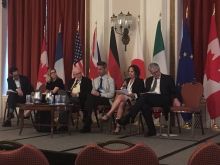
How can civil society build the most effective and fruitful relationship with the G7 processes, both now and for years to come? This was the question guiding the 2018 C7 Summit, hosted in Ottawa from May 27-28, 2018 by the Canadian Council for International Cooperation (CCIC), Climate Action Network Canada (CAN) and the G7Global Taskforce.
Over the course of the two-day Summit, members of civil society organizations from Canada and other G7 countries brought to life a shared vision for the type of world we wish to build, and the enabling conditions necessary to get there. Participants agreed on the themes of justice, equity, sustainability and interconnectedness as critical for establishing the enabling conditions to build a synergistic and positive relationship with the G7.
To set the stage for the discussions, participants heard from the other “7” meetings in Canada, including the S7(Science), the Y7 (Youth), the T7 (Thinktank) and the W7 (Women). While speakers from these groups spoke of different priorities (such as gender equality, combating climate change, justice for workers and peace and security), they brought similar messages of the need for focus, intersectionality and continuity throughout the process of engaging with the G7.
Peter Boehm, Deputy Minister for the G7 Summit and Personal Representative of the Prime Minister, emphasized why the G7 matters, noting that, if done right, it can be a moment to gather leaders for a frank conversation about how to truly make headway in tackling the “big issues” facing our world today. He underscored the need for focus and collaboration on the part of civil society to support G7 nations in moving forward in these areas.
The Parliamentary Secretaries for the Ministers of International Development, Status of Women and Finance urged participants to be bold, pragmatic and provocative when combatting structural norms that perpetuate inequality throughout the world. Prime Minister Justin Trudeau echoed these messages, encouraging civil society to continue to do what we do best and help the G7 to break down barriers for the world’s most marginalized people.
For CanWaCH, an organization that focuses on the health and wellbeing of women and girls around the world, these messages rang true and reinforced an important lesson. The Summit demonstrated that for civil society organizations working for women and children’s health in international development, embedding our advocacy within broader messages to demonstrate the linkages to the other “big issues” is key. For example, Celina Cesar-Chavannes, Parliamentary Secretary to the Minister of International Development, spoke to grounding reproductive health and rights within the broader education file. Embracing the intersectionality of issue areas is also a sure-fire way to bridge the domestic and the international for G7 leaders.
With health as foundational to achieving all other outcomes throughout the lifecycle, including education and economic empowerment, our ability to ensure that it remains a focus at the G7 in the years to come will require nimbly adapting to the shifting geopolitical landscape. As we look toward the next year and beyond, sustaining this focus and collaborative spirit will be critical in our work to improve the lives of the world’s most marginalized.
To read more about the outcomes of the C7 Summit, feel free to consult the outcome document prepared following the C7 event.
Published:
June 12, 2018
Author:
Leigha McCarroll, CanWaCH Policy and Governance Officer
Categories:
SHARE THIS POST: